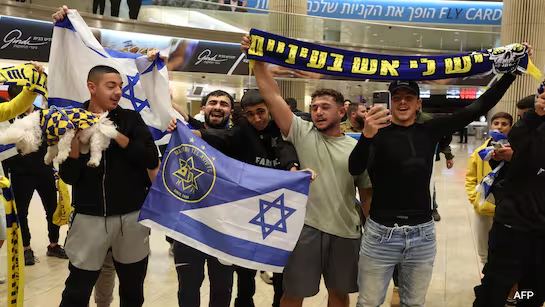Israeli Football Fans Report Antisemitic Violence Following Europa League Match in Amsterdam
Returning from a Europa League match in Amsterdam, Israeli fans of Maccabi Tel Aviv shared chilling accounts of attacks they claim were directed against Jewish people following the game with Ajax. Fans recounted incidents of antisemitic violence in the streets, describing the night as frightening and chaotic, with some saying they were targeted by groups seeking to harm them based on their Jewish identity.
Kobi Eliyahu, 40, described the unsettling experience, recounting how masked individuals appeared “on every corner.” “It was very frightening to see that,” he said. Eliya Cohen, another returning fan, said he witnessed groups “looking for Jews to beat them up” in central Amsterdam shortly after the game. Despite wanting to help fellow fans, he felt the need to quickly leave to ensure his own safety.
Upon arriving back at Israel’s Ben Gurion Airport, fans were met by a large group of reporters and family members eager to embrace their loved ones. The stadium had been packed with supporters, many proudly wearing Maccabi Tel Aviv scarves and jerseys, but the atmosphere shifted drastically once they exited the stadium grounds.
The match, which ended in a 5-0 win for the Dutch team, seemed to fuel further unrest. Five fans were reportedly hospitalized due to the violence, which both Israeli and Dutch officials have condemned as antisemitic. Although Dutch authorities had deployed a considerable police presence to control the situation, fans described chaotic scenes with little visible intervention from law enforcement.

Nadav Zer, a 33-year-old Maccabi fan, shared his distressing experience, explaining how he and others had to run back to their hotel to escape the violence that appeared to be waiting for them. “We heard blasts the whole night, as well as shouts and screams in Arabic,” he said. Zer noted the disturbing absence of police support during the ordeal.
Eliyahu, who had attended the match with his siblings, expressed his deep concern about the lack of police response and said he felt the violence had been “orchestrated.” Reflecting on the experience, he compared it to the environment of 1930s Europe when antisemitic violence surged across the continent.
READ ALSO: WTO Chief Okonjo-Iweala Stands Unopposed for Second Term but Faces Potential Pushback from Trump
“Everybody should understand what happened last night,” he said, calling for Jews to reconsider traveling to Europe. “Israeli and Jewish people should never go to Europe again. They don’t deserve us.”
The violence coincides with rising anti-Israel and antisemitic sentiment globally, exacerbated by the ongoing Israel-Hamas conflict. Anti-Israel protests and reported acts of antisemitism have increased worldwide, casting a shadow over Jewish communities in various cities. Before the match, Dutch authorities reported “incidents on both sides,” contributing to an atmosphere already rife with tension.
An unverified social media video purportedly showed a group of Maccabi Tel Aviv fans chanting inflammatory remarks in Hebrew, saying, “Let the IDF win! We’ll [expletive] the Arabs.” While the authenticity of this video remains unconfirmed, it underscores the intensity of emotions surrounding the game and the broader political context.
Maccabi Tel Aviv’s CEO, Ben Mansford, addressed the press upon his return, condemning the violence as “tragic.” He said that many fans had traveled to Amsterdam not just to support their team, but also to show support for Israel and Jewish identity.
“For them to be running into rivers, to be kicked while defenseless on the floor… that’s very, very sad times for us all.” Mansford emphasized that the violence “was not connected to football,” pointing out that the stadium atmosphere had been largely positive. However, he noted that once fans left the stadium and gathered in public areas, they appeared to be singled out and attacked.

Zer, the fan who ran back to his hotel, described attackers armed with bats and stones roaming Amsterdam’s streets looking for Israelis. “They came from everywhere, and we tried to escape from them,” he recalled. Many attackers were reportedly young men who spoke Arabic, suggesting a complex intersection of cultural and political tensions.
The reports from returning fans paint a distressing picture of the violence that unfolded in Amsterdam, raising concerns over security for Jewish and Israeli sports fans traveling abroad. The incident is a reminder of the heightened challenges faced by global Jewish communities in an era marked by increasing antisemitic violence.
As tensions persist globally, the disturbing experiences of Maccabi Tel Aviv’s supporters underscore the urgent need for heightened awareness and proactive measures to ensure the safety of all fans.
Discover more from Cine critique
Subscribe to get the latest posts sent to your email.

